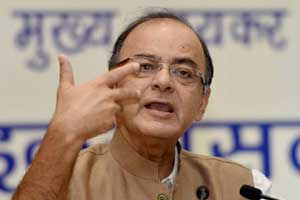Public sector banks (PSB) that were, as per the latest Union Budget, to get fresh capital of Rs 7,940 crore from the government this fiscal are likely to benefit from an additional infusion in the year. Finance minister Arun Jaitley — after a three-hour performance review meeting with PSB chiefs — said on Friday that the state-owned lenders “put up a strong case” for additional capital and that he saw merit in their demand.
The minister also hinted at a calibration of the high interest rates on small savings schemes as banks argued this is one factor that comes in the way of their efforts to transmit the recent repo rate cuts, especially given their limited ability to cut deposit rates. The overall deposit growth in the Indian banking system in the last fiscal year was just 11.4%, a five-and-half-decade low, and PSBs’ deposits grew only slightly higher at around 14%.
Official sources told FE the PSBs sought relaxation of the recapitalisation criteria by shifting from the performance-based ones introduced in January to a need-based approach. The banks also suggested that the proceeds of the proposed Swachh Bharat cess could be given to them to shore up their capital base.
Sources said the finance ministry was open to the demand for relaxing the capitalisation criteria and hinted at effectively reducing the weightage of the performance yardsticks of return on equity and return on assets by bringing in financial inclusion, where most PSBs have done very well, as a new gauge.
The ministry, the sources said, asked each PSB to make a presentation before the department of financial services (DFS) on their capital requirement. While UCO Bank, United Bank of India and Allahabad Bank made their presentations on Friday itself, others will do so soon and the exercise will be completed by July 3.
During the review conference (which was the first such meeting attended by private sector bank chiefs), it was also decided that the DFS will prepare with the help of the ministries concerned and state governments a list of big projects stalled due to financial reasons. Also, a road map will soon be prepared on reducing the banks’ non-performing assets and restructured loans.
Banks have been pitching for a reduction in the interest rates on small savings schemes, which is currently in the range of 8.4-9.2%, with the highest rate being for the Sukanya Samridhi Scheme meant for girl children. The need to keep such high rates for these schemes, which also carry tax benefits, is affecting banks’ ability to attract savings deposits by giving higher returns.
In the meeting, measures to improve credit to the corporate and agriculture sectors as well as ways to improve participation of private banks in the government’s financial inclusion programme (both Jan Dhan and Jan Suraksha schemes) were discussed.
Sources said the chief of a leading PSB said in the meeting that banks could help leverage the proceeds of the Swachh Bharat cess around 9-11 times by lending to cleanliness and related infrastructure projects. This, according to the PSB chief, could be much more effective than the government routing the cess proceeds directly for such schemes. The Modi government, which in the FY16 Budget proposed an up to 2% cess on “all or any taxable service” to promote its Swachh Bharat and infrastructure initiatives, is aiming to collect up to to Rs 1 lakh crore over five years through this additional levy. The cess is yet to be implemented.
As per the performance-based criteria for capital infusion in PSBs, the weighted average of return on assets for all PSBs for last three years was put together and all PSBs, which were above the average, are considered for capital infusion. The second parameter is return on equity for these banks during the previous financial year and, similarly, those performing better than average are to be rewarded. Earlier, the government was infusing capital into the banks hit by equity erosion.
Arun Jaitley had said that to be in line with Basel III norms, there was a need to infuse Rs 2.4 lakh crore as equity in PSBs by 2018. To meet this huge capital requirement, he said, it was important to raise additional resources. While preserving the public ownership, with government holding at least 52%, the capital of these banks will be raised by increasing the public shareholding in a phased manner via sale of shares through retail to Indian citizens, he had said.
The government infused capital of Rs 12,000 crore into PSBs in 2011-12, Rs 12,517 crore in 2012-13, Rs 14,000 crore in 2013-14 and Rs 6,990 in 2014-15. The Reserve Bank of India had also written to the finance ministry that PSBs will need more capital than the Rs 7,940 crore earmarked for this fiscal.
The ministry wants banks to find their own resources for raising capital and also work out plans for raising capital from market. The ministry had said PSBs could also explore the possibility of selling their non-core businesses.
For Updates Check Economy News; follow us on Facebook and Twitter


